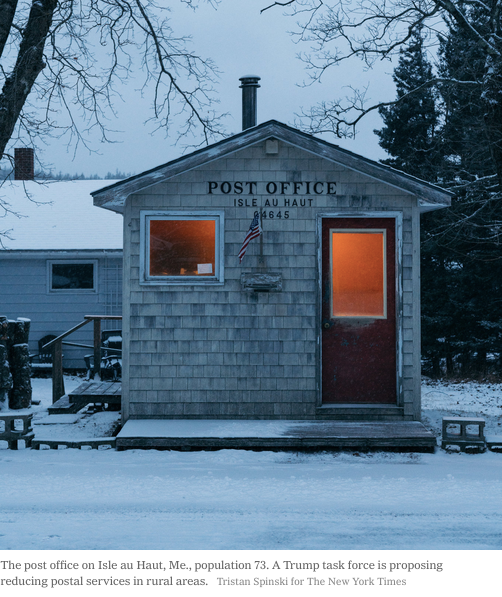Every year on Christmas Eve, my extended family gathers for a meal that can be served at the last minute, whenever we’re ready to eat. This tradition of cold salads, ham balls and cookies goes back to my mom’s childhood.
My mother’s father was a North Dakota postal employee, so on Christmas Eve, she never knew when he would get home. He was determined to keep working, my mom would tell us, “until every Christmas package that could be delivered would be delivered.” He started working for the Postal Service in 1911, and family lore has it that he sometimes had to trudge through the snow on horseback to deliver the mail.
As in my grandfather’s day, today’s postal workers have a mandate to provide universal service, delivering mail and packages to every American household at uniform rates, no matter where they live. That mandate has helped bind our vast nation.
This principle of affordable universal service is under threat. This year, the White House Office of Management and Budget recommended selling the public Postal Service to a private, for-profit corporation.
On Dec. 4, a Trump task force on the postal system followed up with recommendations for partial privatization and other changes that would reduce services and raise delivery prices, particularly for rural communities.
Specifically, the task force urges the Postal Service to change its pricing system to maximize profits on commercial package deliveries. This would be a major blow to families who buy products online and live along high-cost delivery routes.
We’re not just talking about Hawaii and Alaska. Private carriers already impose surcharges, as high as $4.45 per item, for package deliveries to approximately 53 percent of the nation’s 42,000 ZIP codes. These surcharge areas are home to about 70 million people, according to our calculations, in rural areas, small towns and suburbs.
If the Trump task force has its way, customers in these areas would no longer be able to turn to the Postal Service for surcharge-free, lower-cost rates on most of these routes. Small businesses hoping to send mail or packages to these places would also suffer.
Rural communities would also be more likely to lose their local post offices. The task force wants to get rid of a law prohibiting the closing of rural post offices solely because they’re running a deficit. The Postal Service would also have the green light to reduce delivery days from six to five or even fewer days per week and expand the use of cluster mailboxes to replace door-to-door delivery.




